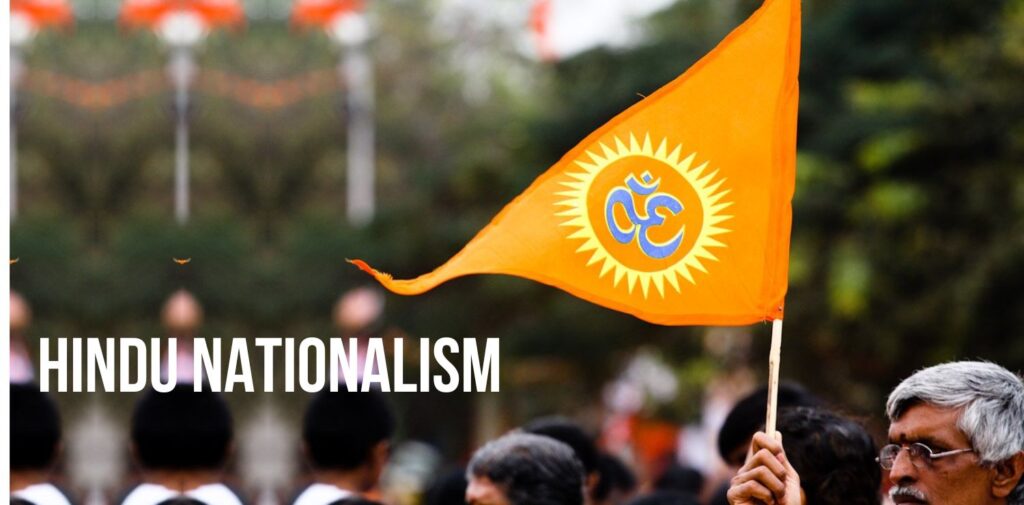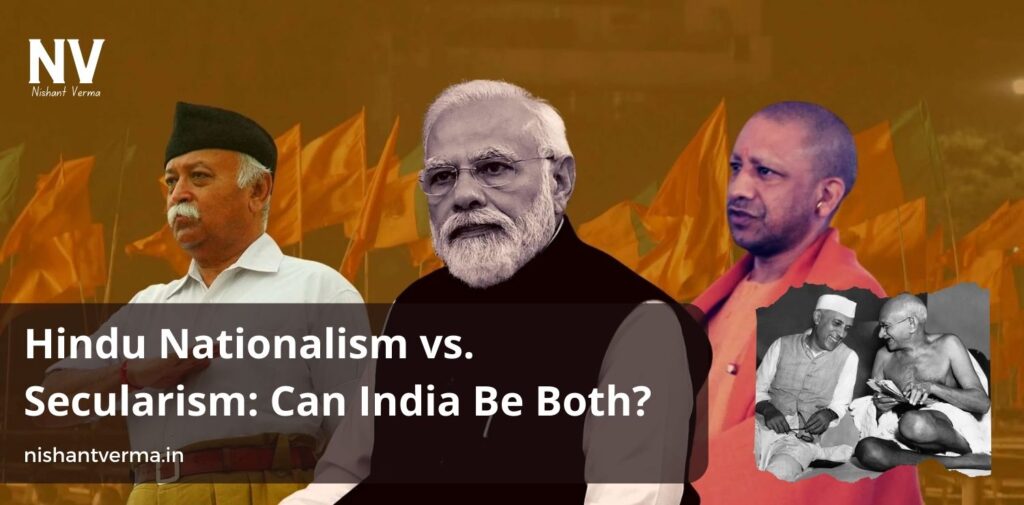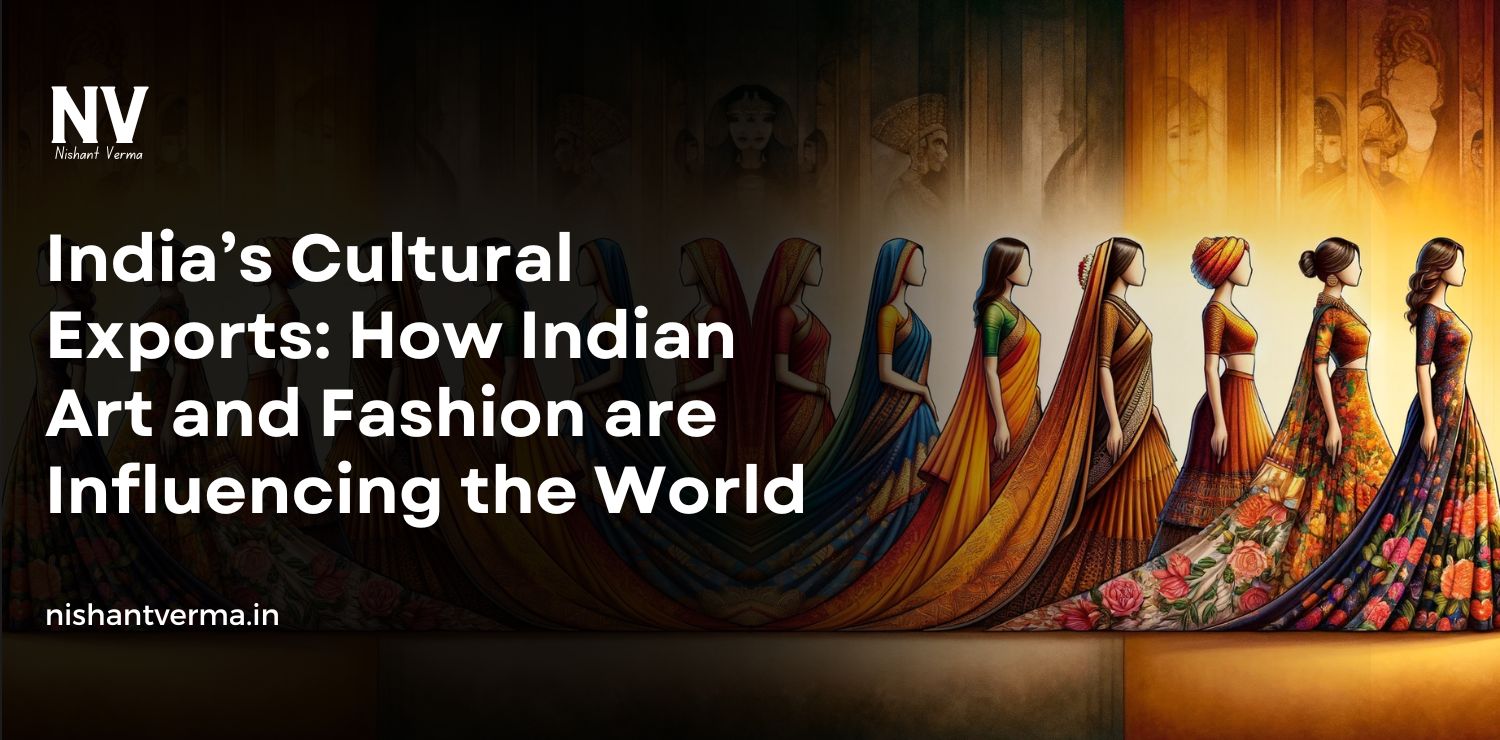India, a land of diverse cultures, religions, and ideologies, has always grappled with the complex question of its identity. At the heart of this debate lies the tension between Hindu Nationalism vs. Secularism. While Hindu nationalism seeks to define India primarily as a Hindu nation, secularism aims to ensure that the state remains neutral and does not favour any religion. The question, therefore, is whether India can truly embrace both these concepts simultaneously.
Understanding Hindu Nationalism
Hindu nationalism, often associated with political movements like the Rashtriya Swayamsevak Sangh (RSS) and the Bharatiya Janata Party (BJP), is a belief system that asserts India as a predominantly Hindu nation. It is rooted in the idea that the culture, civilization, and history of India have been shaped by Hinduism. Proponents of Hindu nationalism argue that India’s identity cannot be separated from Hindu values, traditions, and practices.
Supporters of Hindu nationalism point to the long history of Hinduism in the subcontinent. They emphasize that India’s spiritual and cultural legacy is deeply intertwined with Hindu beliefs, festivals, and rituals. To them, the majority Hindu community’s cultural dominance should be reflected in the nation’s political and social landscape. They also argue that the protection and promotion of Hindu identity is essential in a country where religious minorities, such as Muslims and Christians, are often seen as foreign influences.

Key Arguments for Hindu Nationalism:
- Cultural Continuity: Hinduism has been the dominant religion in India for thousands of years, and proponents believe that it forms the backbone of India’s cultural and civilizational heritage.
- Majority Rights: Supporters argue that as the majority religion, Hinduism should play a central role in the country’s national identity. They believe that Hinduism is not just a religion but a way of life that binds the diverse regions and communities of India together.
- National Pride: There is a growing sense of nationalism that ties India’s political future with the revival of its Hindu cultural roots. This is seen as a response to historical periods of foreign rule, such as the Mughal Empire and British colonialism, where Hindu identity was suppressed.
- Unity through Shared Values: Advocates believe that Hindu values like tolerance, non-violence (ahimsa), and spiritual philosophy can unite the country in a way that transcends religious differences.
Understanding Secularism in the Indian Context
Secularism, as defined in the Indian Constitution, means that the state should neither favour nor discriminate against any religion. India is a country with a vast diversity of religions, including Hinduism, Islam, Christianity, Sikhism, Buddhism, Jainism, and others. Secularism was adopted as a principle to ensure that the state remains neutral and treats all religions equally.
India’s founding fathers, including Jawaharlal Nehru, were firm believers in secularism. They believed that a secular state would provide a framework for peaceful coexistence among the many religious communities in the country. This principle was enshrined in the Indian Constitution, which declares India to be a “secular republic”. The idea was to create a nation where people of all faiths could live together without fear of discrimination based on religion.

Key Arguments for Secularism:
- Religious Diversity: India is home to multiple religions, each with its traditions, beliefs, and practices. Secularism ensures that the state respects this diversity and does not impose any particular religious ideology on its citizens.
- Equality: Secularism guarantees equal treatment for all citizens, regardless of their religious background. The state is expected to protect the rights of religious minorities and ensure that no group is given preferential treatment.
- Social Harmony: By remaining neutral, secularism fosters social peace by preventing religious conflict. It seeks to prevent any single religion from dominating the political or cultural landscape.
- Modernization and Progress: Secularism is seen by many as an essential element for India’s modernization. In a globalized world, where technology and science shape the future, secularism allows the country to move forward without being bogged down by religious dogma.
The Tension Between Hindu Nationalism and Secularism
At first glance, it might seem that both Hindu nationalism and secularism can coexist peacefully. However, the two are fundamentally different in their approach to the nation’s identity.
- Hindu Nationalism’s Vision of a Hindu Nation: Hindu nationalism sees the nation as a Hindu state, where Hinduism is the central force in shaping the country’s identity. This vision can sometimes clash with the idea of secularism, which requires the state to treat all religions equally, without favouring one. The very concept of a “Hindu nation” could be seen as contradictory to the principle of secularism.
- Secularism’s Demand for Religious Neutrality: Secularism demands that the state does not promote or favour any religion. It advocates for a separation between religion and politics, where public policy is made without religious influence. Hindu nationalism, on the other hand, is inherently tied to religious identity, which makes it difficult for the two to align. Secularism in India strives to protect the rights of all religious communities, while Hindu nationalism focuses more on the promotion of Hindu interests.
- Religious Identity vs. National Identity: The idea of a nation based on religious identity (Hindu nationalism) is in direct contrast with the secular idea of a pluralistic nation where people of different faiths can coexist peacefully. While Hindu nationalism seeks to define India’s identity through Hindu religion and culture, secularism defines it as a nation where every religion has the same standing in the eyes of the law.
- Religious Discrimination: The rise of Hindu nationalism in India has raised concerns about the marginalization of religious minorities, particularly Muslims and Christians. Secularism, in contrast, works to ensure that no religion is discriminated against. This creates a tension between the growing influence of Hindu nationalism and the commitment to secular values.

Can India Be Both?
The question remains: Can India be both a Hindu nationalist state and a secular republic at the same time?
For many, the answer seems clear: India cannot be both. If India chooses to embrace Hindu nationalism, it risks alienating its religious minorities and undermining the secular principles upon which the country was founded. The Indian Constitution and the country’s democratic values are based on the idea that all citizens, regardless of their religion, should be treated equally by the state. A shift towards Hindu nationalism could undermine this principle, leading to a situation where the rights and freedoms of non-Hindu communities are compromised.
On the other hand, if India continues to uphold its secular ideals, it must ensure that religious nationalism does not take root in the country’s political system. Secularism, in this sense, is seen as a safeguard for unity and peace, as it creates a framework for all citizens to coexist without fear of discrimination based on religion.
Conclusion: The Audience’s Opinion
The debate over whether India can be both Hindu nationalist and secular continues to divide opinion. Many people feel that India’s identity is so deeply rooted in Hinduism that it is impossible to ignore this fact. For them, embracing Hindu nationalism is a natural step toward reinforcing the country’s cultural heritage and ensuring that Hinduism plays a central role in national life. Others believe that India’s true strength lies in its pluralism and diversity, and that secularism is the only way to preserve this rich tapestry.
Ultimately, it seems that India cannot fully embrace both Hindu nationalism and secularism. The two ideologies are simply too different in their approach to religion and identity. Hindu nationalism seeks to define the nation through a particular religious lens, while secularism insists on religious neutrality. Therefore, the future of India may depend on the choice its citizens and leaders make between these two visions: a nation shaped by its religious majority or a nation that upholds the values of equality, diversity, and secularism.




